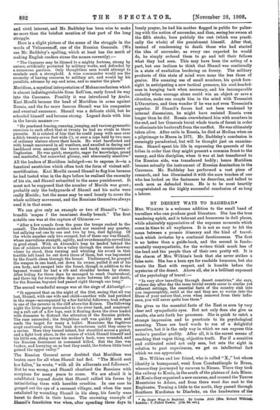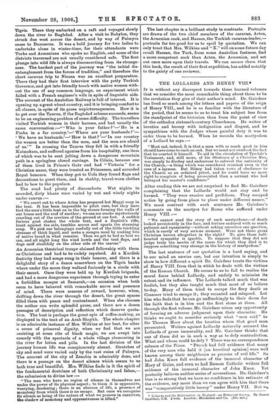BY DESERT WAYS TO BAGHDAD.*
MRS. WILKINS is a welcome addition to the small band of travellers who can produce good literature. She has the true wandering spirit, and is tolerant and humorous in dull places,
while admirably appreciative of the supreme moments which come in time to all wayfarers, It is not so easy to hit the mean between a prosaic itinerary and the kind of travel- book which irritates by a continual facetiousness. The first is no better than a guide-book, and the second is funda- mentally unsympathetic, for the writers think much less of the land and the people than of their own pretty wit. It is the charm of Mrs. Wilkins's book that she never strikes a false note. She has a keen eye for roadside humours, but she treats the East with respect, and is humble before the mysteries of the desert. Above all, she is a brilliant exponent of the psychology of travel :— "In very slow travelling through desert countries," she says, " where day after day the same trivial events occur in similar yet different settings, the essential facts of the country sink into you imperceptibly, until at the end they are so woven into the fibres of your nature that, even when removed from their influ- ence, you will never quite lose them."
She gives us the essential facts of the East as seen by very clear and sympathetic eyes. But not only does she give us results, she sets forth her processes. She is quick to catch a strange impression and to penetrate to its psychological meaning. These are bard words to use of a delightful narrative, but it is the only way in which we can express this writer's peculiar quality. After all, it is the surest means of reaching that vague thing, objective truth. For if a sensitive and cultivated mind not only sees, but sets the sight in
relation to past experiences, we get an intellectual fact which we can appreciate.
Mrs. Wilkins and her friend, who is called "X.," but whose identity is transparent, went from Constantinople to Brusa, whence they journeyed by caravan to Nicaea. There they took the railway to Konia, in the south of the plateau of Asia Minor.
At Konia they organised a new caravan, and crossed the Taurus Mountains to Adana, and from there went due east to the Euphrates. Turning a little to the north, they passed through Southern Kurdistan to Diarbekr, on the headwaters of the
• By Deurt Ways to Baghdad. By Louisa Jebb (Mrs. Roland Wilkins). London T. Fisher Unwin. 1108. 6d. Data
Tigris. There they embarked on a raft and voyaged slowly down the river to Baghdad. After a visit to Babylon, they struck due west across the desert, and by way of Palmyra came to Damascus. It was a bold journey for two ladies to undertake alone in winter-time, for their attendants were Turks and Armenians who spoke no English, and some of the districts traversed are not usually considered safe. The first plunge into wild life is always disconcerting from its strange- ness. The hardest part of the journey was "the initial dis- entanglement from the forces of tradition," and therefore the short caravan trip to Nicaea was an excellent preparation. There they had their first interview with the petty Turkish Governor, and got into friendly touch with native women with- out the use of any common language, an experiment which failed with a French engineer's wife in spite of linguistic aids. The account of the Anatolian Railway is full of interest. It is opening up a great wheat country, and it is bringing comfort to all classes, in spite of its gross unpicturesqueness. How it is to get over the Taurus, if the Baghdad scheme succeeds, seems to be an engineering problem of some difficulty. The travellers visited Turkish women in their harems, and had usually the same conversation :—" ' Who is your father?'—' He is a Pasha in a far country.'—' Where are your husbands ?'— ' We have no husbands.'—' How is that?'—' In our country the women are better than the men, and the men are afraid of us." In crossing the Taurus they fell in with a friendly Kaimakam, and suffered agonies from his hospitality, one item of which was to be sent jolting down a dangerous mountain path in a springless closed carriage. In Cilicia, because one of them lived in Prince's Gate and had " Victoria" for. a Christian name, they were treated as Princesses, and accorded Royal honours. When they got to Urfa they found flags and decorations to greet them, and in shabby, travel-worn clothes had to bow to the populace.
The road had plenty of discomforts. Wet nights in crowded, dirty khans were varied by wet and windy nights under canvas :-
" We crawl out to where Arten has prepared hot Maggi soup in the tent. It has been impossible to pitch ours, but they have tied the men's little tent on to the big stones forming the walls of our house and the roof of another; we can see smoke mysteriously crawling out of the crevices of the ground at our feet. A sudden furious gust shakes the whole tent, and a Zaptieh's rifle, leant against the side, tumbles across and upsets the steaming soup. We pick our belongings ruefully out of the little trickling streams of thick liquid, and make a meagre meal by soaking bits of native bread in what remains. Then we get to bed as best we can, and all night long the wind howls and the tent flaps, and dogs sniff stealthily on the other side of the canvas."
An Armenian theatrical troupe claimed fellowship with them as Christiana and had to be rudely repulsed. At a Kurdish
festivity they had songs sung in their honour, and there is a delightful story of a dance somewhere on the Tigris banks where under the moon they waltzed furiously in a circle with their escort. Once they were held up by Kurdish brigands, and had a more dangerous experience through trying to enter a forbidden mosque at Samarah,—an occasion when both seem to have behaved with remarkable nerve and presence of mind. There were seasons of reward, however, when, drifting down the river through the desert, the great spaces filled them with peace and contentment. When she chooses the author can write splendid prose, and there are a dozen passages of description and reflection which deserve quota- tion. The best is perhaps the great epic of coffee-making, as displayed in the tent of an Arab Shayk h. The whole chapter is an admirable instance of Mrs. Wilkins at her best, for after a scene of primeval dignity, when we feel that we are assisting at some rite of black magic, we are swept into comedy with the spectacle of a whole village clamouring in the river for lotion and pills. In the last division of the journey human life was conspicuously absent. Stretches of sky and sand were varied only by the vast ruins of Palmyra. The account of the city of Zenobia is admirably done, and
there is a passage on the desert silence which seems to us both true and beautiful. Mrs. Wilkins finds in it the spirit of the fundamental doctrines of both Christianity and Islam,—
the submission to divine law :—
" The men who have no region of silence in themselves are under the power of its physical aspect ; to them it is oppressive, wearying, deadening ; there is an absence of life, a presence of monotony from which there is no escape. But once we recognise its silence as being of the nature of what we possess in ourselves, the shadow of monotony and oppressiveness is lifted."
The last chapter is a brilliant study in contrasts. Portritits are drawn of the two chief members of the caravan, Arten, the Armenian cook, and Hassan, the Turkish caravan-leader,- portraits far too good for us to spoil by quotation. We can only trust that Mrs. Wilkins and " X." will on some future day recall Hassan, the Turk, from some Anatolian fastness, find a more competent cook than Arten, the Armenian, and set out once more upon their travels. We can assure them that this book, the result of their first expedition, has added notably to the gaiety of one reviewer.



















































 Previous page
Previous page